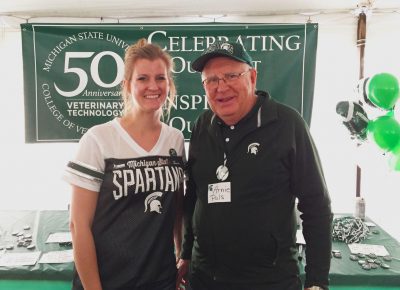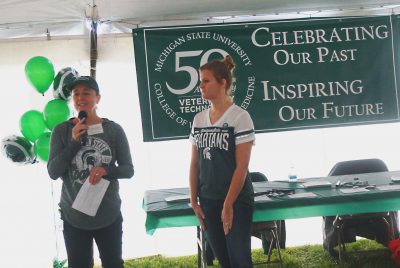
This year, the MSU College of Veterinary Medicine’s Veterinary Technology Program celebrates its 50th Anniversary. The Program has been through many changes since it was established in 1968. When it began, the Program was non-degree-granting and administered through the Center for Laboratory Animal Resources. 18 students enrolled in the first class, and they studied a 6-quarter curriculum focused on laboratory animal medicine.
At that time, and because MSU is a land grant university, the Institute of Agricultural Technology in the College of Agricultural Natural Resources (CANR) was the only administrative body permitted to offer two-year education opportunities. As a result, the College shared administrative responsibilities with CANR, and funding and curriculum content were jointly delivered and administered. Graduation resulted in a Certificate of Completion.

In the early 70s, the emphasis of the Program shifted from laboratory animal care to clinical veterinary practice. From that point on, veterinary technology students received their clinical training in conjunction with veterinary medical students and participated in the same clerkships.
The Program was re-organized to meet the American Veterinary Medical Association (AVMA) requirements in 1973, and was accredited by the Committee on Veterinary Technician Education and Activities. It was the first of two programs in the country to be accredited by the AVMA, and has retained full, unbroken accreditation to this day.
In 1979, the curriculum was extended to seven quarters. In 1992, the Program was recognized by the College as a distinct academic department. In addition, the College entered a consortia agreement with Lansing Community College (LCC) that resulted in the conferral of an Associate’s Degree in Applied Science from LCC and a Certificate of Completion in Veterinary Technology from MSU. In 1994, the curriculum was adapted to meet University requirements for a Bachelor of Science degree.
Today, in coordination with the College’s 2016–2019 Strategic Plan, the Program is engaging with the College to facilitate a progressive workplace that strives to foster and prepare graduates for varied career opportunities, and facilitates the generation of new knowledge that benefits animal and human health on a global scale.

With all the changes to the Program, improving student experience and education remain the program administrators’ primary concerns. “Our program has high standards,” says Taylor Epp, director of the Program. According to Epp, the Program is dedicated to guiding students through active exploration of career options with both curricular and non-curricular means. “We work to assist students in meeting those standards by creating more flexible learning options and strengthening student support systems,” she says.
The Program is working toward national prominence, making the College a leader in veterinary technology education in a fast-changing, modern world. “We are working to elevate veterinary nursing and bring it into expanding areas of veterinary medicine, such as animal agriculture and telemedicine,” says Epp.
These efforts have not gone unnoticed. This fall, MSU received a top 20 ranking from College Choice for best undergraduate veterinary degrees in the nation because of the College’s Veterinary Technology Program.
“We strive to empower students,” says Epp. “We are dedicated to the creation of highly sought-after, career-ready graduates who exceed expectations.”
